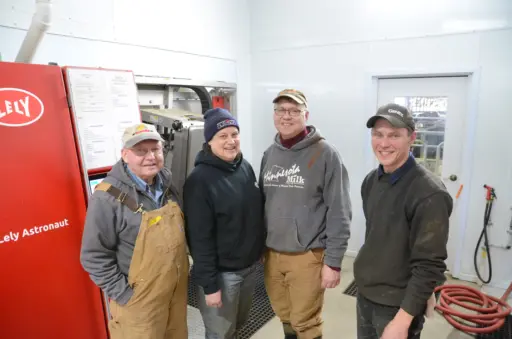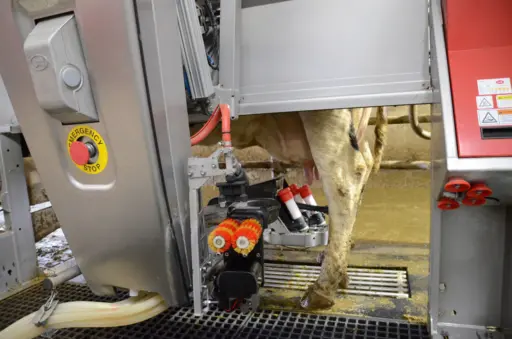Nestled just east of Minnesota’s Lake Minnewaska, Dorrich Dairy’s Vold family incorporates sustainability into their daily routine on their 450-cow dairy. In fact, in 2015, the 4th generation family farm won the U.S. Dairy Sustainability Award for Outstanding Dairy Farm Sustainability.
Fast forward five years later and sustainability is still at the forefront of their business.
“Sustainability is never ending; we are always looking at it,” says dairy farmer and Minnesota board member Suzanne Vold.

The Vold family focuses on continuous improvement in several areas on their farm including by investing in three key areas: manure management, crop practices and robotic milking technology.
In 2016, Dorrich Dairy drastically improved its manure management system. The family installed a manure separator, which separates solids from liquids, and a composter system. Subsequently in 2018, they also built a new lagoon for liquids with a greater holding capacity of 14 months.
“As weather patterns are more and more unpredictable, we have the peace of mind that we will still be applying manure at agronomic rates at the right time in the right conditions,” states Vold. She adds that this was one of the best decisions all the way around. The composter drum resembles a large Pringles can turned on its side. Raw manure solids go in and 24-hours later, composted solids come out. The composter naturally heats to 150-160 degrees to inhibit any pathogens. The dairy farm utilizes the composted solids to provide a comfortable bed for its dairy cows. Excess compost is either sold to neighbors or applied to the crop fields.
The farm also continues to make modifications throughout the year with help from their agronomic advisors regarding their cropping. Like many dairy farmers, the family raises alfalfa, corn and soybeans. However, they’ve fully adopted no-till practices with their soybean crop and experiment with no-till practices on their corn acreage. Switching to a no-till practice helps decreases soil erosion.
Additionally, they’ve been experimenting with cover crops long before 1995 when Suzanne joined the farm. Routinely, alfalfa is planted with a nurse crop as the perennial stand becomes established. More recently, the family has planted winter rye on its no-till soybean acres and harvested the rye as forage in the spring. The past two growing seasons, they’ve dabbled in adding cover crops to their corn sileage acreage. They continue to work with experts to maximize conservation efforts.
The most dramatic change to Dorrich Dairy is the addition of seven robotic milkers in the fall of 2019. Always forward thinking, the family didn’t just want to grow in size; they wanted to become more efficient. Therefore, robots were an easy choice.

The family and one additional full-time employee manage the daily activities. With a few taps of the keyboard and clicks of a mouse, individual cow records can be accessed. Vold says: “There is so much more information, and we are constantly learning how to use all the information.”
Dorrich Dairy has seen whole farm energy efficiency gains with their farm renovations. Due to more consistency on their electrical loads and upgraded equipment, their energy use and bills are comparable to previous year’s bills even though they’ve added new equipment that runs 24-hours a day.
Dorrich Dairy defines sustainability by relating back to their farm’s values. One value is “Doing the right thing.” Vold explains this means doing the right thing not only today, but the right thing for future generations.
“Farmers are in it for the long haul. We, and other farmers alike, don’t think of our business in terms of number of years but rather generations,” she says. “Every decision we make isn’t looking at profit this year, it’s looking at what will this decision return in the long term and how this will bring our business to the next generation.”
Furthermore, she explained that the public perception of sustainability previously focused on land, air and water. Today, that definition has morphed to include community involvement, employees, work conditions and more. She points out that this new definition encompasses many of the things the dairy community has always done.
“It’s what we do naturally,” Vold says. “We take care of our natural resources where we live and work. We protect our families and livestock. We are involved in our community. It’s something that we do naturally and not a novel concept.
“Farmers, and dairy farmers specifically, have been doing things that are sustainable for generations and we don’t think anything of it” Vold shares.
She challenges fellow dairy farmers to share what they are doing every chance they can — whether talking to someone in line at the grocery store, creating a social media account, or even presenting to the local Rotary club. Vold concludes, “It’s an individual decision, but there are ways that each of us can ensure our story is being told.”
Through their investment in these areas, and responsible and sustainable farming practices, the Volds aim to ensure their business not only nurtures the community but can passed on to the next generation.
*Photos featured in this article were taken prior to March 2020 before mandatory mask/social distancing mandates were implemented.